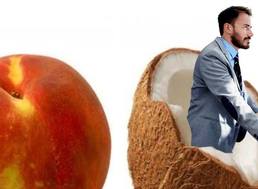As a result, I usually start my intercultural coaching sessions with the following question:
“Can you describe your cultural software?”
As coachees themselves admit, this can be one of the most difficult questions for them. They often start by thinking about their own national culture, and switch into stereotypical descriptions which they have conventionally heard.
Being Slovak myself, perhaps I should reveal some descriptions I have heard attributed to Slovaks:
· Slovak managers are hard working.
· Slovak managers are always punctual and arrange meetings well in advance.
· Slovak managers are a little reserved during first meetings.
· Slovak managers are indirect while delivering feedback.
However, my purpose is to facilitate YOU in discovering your own “cultural software”. So, let’s discover WHO YOU ARE and ponder how that question relates to your own private and social behaviour, and how your behaviour reflects your cultural software:
“Do you belong to the “Coconut” or “Peach” culture?
Some hints for you while thinking about your answer:
“Peach” culture representatives tend to be friendly to people they have just met. They often smile at strangers, chat and share information. However, after overcoming the initial stage of friendliness, you may find their real private self is protected by a hard shell and it is difficult to establish deeper relationships.
In contrast, in a “Coconut” culture, people tend to be more reserved with those they have not yet built up a relationship with. In this type of culture, people rarely smile at strangers or share information with those they have not been in touch with before. They need time to get to know people and only then can they let business partners, colleagues or neighbours break through their outer shells. Afterwards, the relationship will become more open and warm, and would probably last for a long time.
The interaction between representatives of “Peach” and “Coconut” cultures can bring many surprises. When people from “Coconut” culture think that there was a very quick establishment of mutual friendship which could be turned into a long lasting relationship, the reality was that people from “Peach” culture were only having an interesting discussion; sharing a little private information. They do not feel a strong commitment to continue the relationship in private, or in future business interactions. Invitations to meet later, do business together, or enjoy some private time in an activity together are viewed by “Peaches” as just part of a nice conversation which belongs to convention. “Coconuts” can be disappointed when no invitation is forthcoming, or if a business partner does not respond to a submitted business offer.
The final note:
Slovaks have the tendency to belong to “Coconut” culture. As a result, we are sometimes viewed as “grumpy” by those who come from the “Peach” culture.



























































